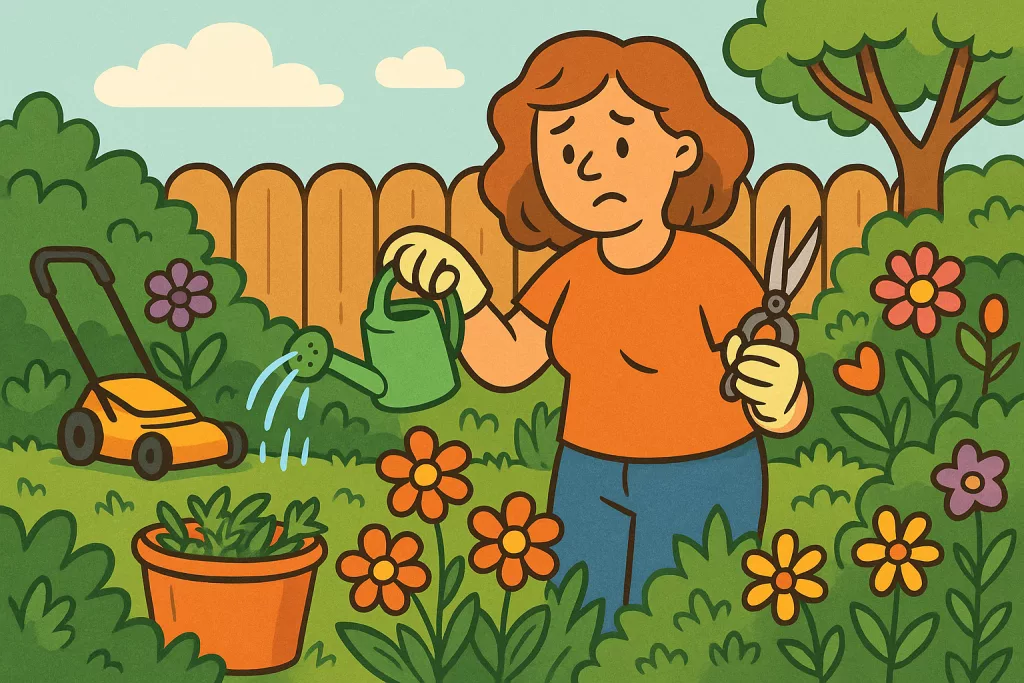If you’re like me—keen to have a gorgeous garden but convinced you waltzed through the “green thumb” class and still flunked—you’re in the right place. This guide, How to Maintain a Beautiful Garden Without a Green Thumb, is your invite to the low-effort horticulture club. And we’ve thrown in the hot, trending 2025 garden vibes to make your space look smart, sustainable, and totally doable.

1. Trending, Low-Maintenance Garden Styles
Native Plant Powers
Designers today are all about native plants—because they’re basically garden superheroes. They evolved over centuries to survive your exact weather without sulking or whining for chemicals. They need less water, no fertilizers, and attract wildlife like bees and birds. Talk about dropping hints to Mother Nature.
Wildlife-Friendly & Biodiverse Gardens
You don’t just want plants—you want a mini ecosystem. Wildlife gardens (a.k.a. habitat gardens) mean using diverse plant layers, water features, log piles, and bee boxes. It’s like giving your garden a personality—it’s not just pretty, it’s alive.
Micro-Forests, Vertical Gardens & Smart Spaces
Space-limited or lazy? Micro-forests (tiny dense clusters of trees/shrubs) are in. Vertical gardens? Still trendy and perfect for not bending over to weed. And yes, smart gardens with app-controlled irrigation—so you can nap while your plants get watered.
Slow Gardening — Zen Mode Activated
Slow gardening is a vibe—it’s about ditching perfection, slowing down, and letting nature do its thing. You compost, journal your garden, water wisely, and chill. It’s less upkeep, more internal peace.
2. Smart Plant Choices That Do the Heavy Lifting
Low-Maintenance Stars
Imagine plants so chill they practically raise themselves:
- Snake Plant & Aloe Vera (indoor low light)?
- Lavender, Coreopsis, Zinnias, Marigolds (pollinator magnets, drought champs)?
- Sedum, Spider Plant (ignore ’em, they’ll survive)?
Shrubs That Don’t Whine
Southern Living lists shrubs like Burning Love™ Leucothoe, Mojo® Pittosporum, Encore® Azalea, Beautyberry—they bring color and wildlife love, with little pruning.
Edible + Attractive = Foodscaping
Who said gardens can’t be functional AND pretty? Foodscaping blends edible plants—herbs, berries, choy, even fruit trees—into your ornamental layout. You get beauty and a snack.
3. Tech & Tactics: Keeping It Lazy but Lovely
No-Dig Gardening (Let the Worms Do the Work)
Stop digging (literally). Layer mulch, compost, let soil organisms do the mixing. Your back thanks you, and soil stays healthier. It’s like a spa treatment for dirt.
Matrix Planting
This one’s like setting up your garden to win. Dense, layered planting covers the ground, squashes weeds, and builds a self-sustaining mini guild. Think less weeding, more winning.
Sponge Cities & Permeable Surfaces
Urban folks—skip mowing and watch flooding. Use rain-friendly gardens, gravel, permeable pavers, even front yard parking that still looks green. It’s practical and eco-smart.
4. Blueprint: Easy Steps to Start Your Garden (No Expertise Needed)
Ready to get your hands… kinda clean? Here’s the game plan:
Start small. Pilot experiment with containers or one bed. Baby steps win. Don’t chase Pinterest perfection—begin with a 4×4 plot or some patio containers. You can always expand once you know what works in your space.
Pick local! Talk to local nurseries or botanical websites to find native choices—they’ll survive your climate quirks. Native plants are the neighborhood kids who already know the local weather and soil. Less water, fewer problems, zero drama once established.
Mulch & no-dig. Layer that compost, leave soil alone, let it build magic. Digging destroys the underground fungal networks plants depend on. Instead, pile organic matter on top—compost, leaves, grass clippings. The earthworms do the mixing for free.
Layer it. Mix shrubs, perennials, groundcovers (matrix planting). Turf is optional. Think forest layers: shrubs as backbone, perennials for seasonal color, groundcovers to knit everything together. More interesting than lawn, supports more wildlife.
Add wildlife hospitality. Bee hotels, a birdbath, butterfly-loving flowers—get invites out. Wildlife works for you: bees pollinate, birds eat pests, beneficial insects keep things balanced. Add shallow water (under 2 inches deep) and flowers that bloom spring through fall.
Think smart/slow. Use drip hoses, app-controlled water, or just chill and garden on your terms. Set up systems that work when you’re busy: drip irrigation, slow-release fertilizers, plants that thrive on neglect. Garden should fit your life, not rule it.
5. Biblically Inspired Encouragement (Because You Asked for Christian Perspective)
“Consider the lilies”—Jesus didn’t say, “Go do backbreaking mulch.” God gave us gardens that teach patience, beauty, and provision. You don’t need green-thumb superpowers; you just need to obey the call to nurture what He’s given you (Genesis 2:15 vibes). Every plant you water, every flower that blooms—that’s grace disguised in chlorophyll.
Slow gardening? That’s like Sabbath for your soul and soil. Let it be gentle, let it be intentional. You’re not failing; you’re learning to steward—just like God teaches us.
6. Wrap-Up & Quick Recap
You’ve got a solid game plan for gardening success, no green thumb needed! We’ve explored trending styles like wildlife-friendly gardens that attract pollinators, foodscaping for edible beauty, micro-forests for small-space biodiversity, smart gardens with tech to ease the load, and slow gardening to enjoy the journey. We highlighted tough plants like lavender and coneflowers that thrive on neglect, plus time-saving tactics like no-dig gardening and matrix planting to keep weeds at bay with minimal effort. And we threw in some encouragement: your efforts matter, even if a few plants don’t make it.
How to Maintain a Beautiful Garden Without a Green Thumb—it’s not about natural talent; it’s about smart, practical choices.
That sums it up: gardening is doable with the right approach. You’ll see it one more time before we’re done (third time’s the charm!). Keep making those smart moves, and your garden will shine with minimal fuss.
References
- National Garden Association. (2022). Gardening for Beginners: Easy Tips to Start a Garden Without Experience. Retrieved from https://garden.org/learn/articles
- Royal Horticultural Society. (2023). Low-Maintenance Gardening Ideas. Retrieved from https://www.rhs.org.uk/advice/
- Better Homes & Gardens. (2021). How to Keep a Beautiful Garden with Minimal Effort. Retrieved from https://www.bhg.com/gardening/






